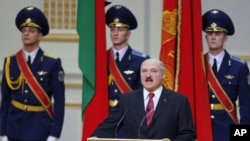European Union foreign ministers have imposed sanctions against Belarus in response to the violent arrests and imprisonment of opposition politicians following presidential elections last December. The sanctions target members of the government headed by President Alexander Lukashenko. The US also followed with an announcement of travel bans and asset freezes targeting the same list of officials.
The sanctions include travel bans to the European Union for 158 top Belarussian officials, including President Alexander Lukashenko and his two elder sons. All European bank accounts of Belarussian leaders will also be frozen.
The 27 foreign ministers to the European Union said that the sanctions were punishment for the treatment of opposition politicians and protesters in December.
Tens of thousands took to the streets of Minsk to protest the election results. According to Belarussian authorities, Mr. Lukashenko got nearly 80 percent of the vote. But the OSCE said the the election was seriously flawed.
More than 600 people were arrested, including five opposition presidential candidates. Opposition leaders Andrei Sannikov and Viktor Neklyaev were also beaten before being taken away by officers of an agency still called the KGB in Belarus.
Mr. Neklyaev was unexpectedly released from prison Saturday and placed under house arrest, in an apparent last-minute attempt to appease the Europeans. But Mr. Sannikov, two other opposition politicians, and more than 20 other protesters remain behind bars. They are facing up to 15-years imprisonment.
The violent treatment of opposition candidates was met with international condemnation. U.S. Secretary of State Hillary Clinton and High Representative for Foreign Affairs and Security Policy of the European Union Catherine Ashton issued a joint statement voicing their concern for the treatment of the opposition in Belarus.
Deputy Assistant Secretary of State for Democracy and Human Rights Thomas Melia said that the aftermath of the presidential elections in Belarus was a continuing obstacle to normalizing relations with the country.
"Any kind of return to improvement in our relationship requires fundamentally the immediate release of dozens of people that have been incarcerated and the dropping of charges against all those who have been charges with offenses supposedly related to the events of December 19," he said.
Last week, Lukashenko threatened to retaliate against sanctions from the European Union. The Belarussian head of state scorned the EU for condenming the presidential elections. He also accused Poland and Germany of financing the opposition candidates and plotting to overthrow his regime.
Neklyaev, as well as the jailed opposition members are awaiting trial. But no dates have been set for any legal procedings.
Meanwhile, 10 peaceful demonstrators were arrested late Sunday outside KGB headquarters. The protesters were there to show support for jailed opposition leaders.
EU, US Slap Sanctions on Belarus




